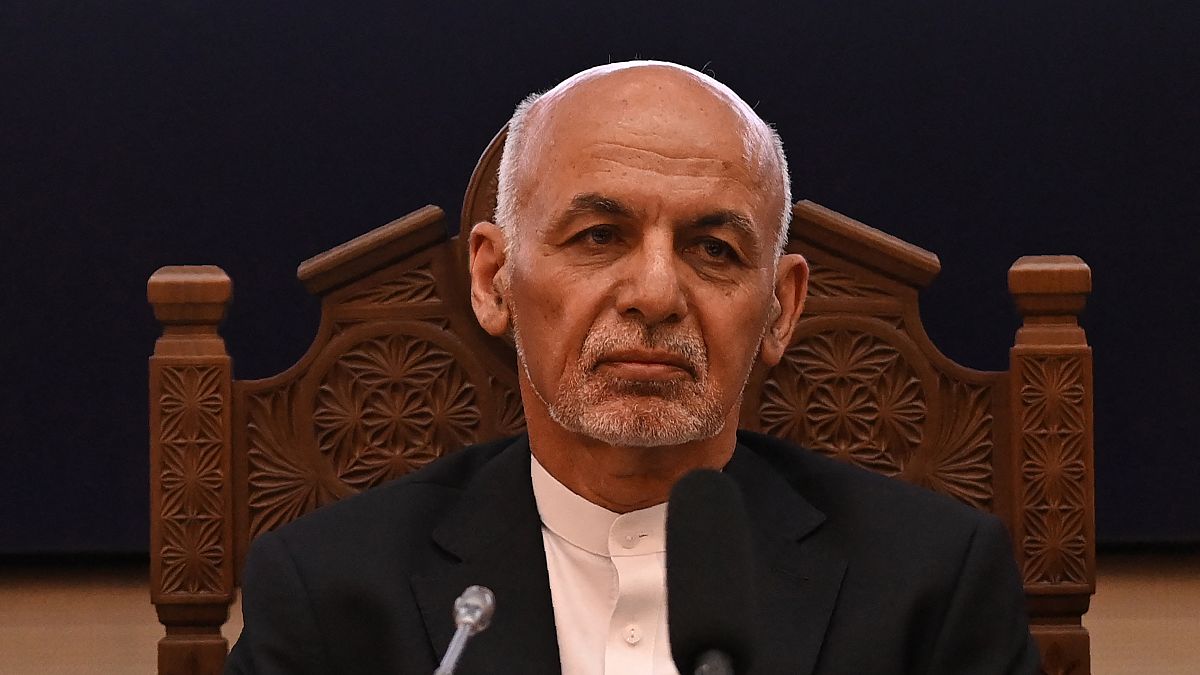An anti-Taliban protest was violently broken up in the east on Wednesday, while Western evacuations continued from Kabul. Afghanistan's ousted President Ghani has addressed his people from the United Arab Emirates.
Exiled Afghan President Ashraf Ghani on Wednesday defended his decision to leave Kabul as the Taliban advanced and eventually toppled his government.
He claimed that he was "forced to leave Afghanistan with one set of traditional clothes, a vest and the sandals I was wearing." Ghani left Afghanistan on Sunday just as the Taliban approached Kabul.
In a video posted on his Facebok page, Ghani also confirmed that he was in the United Arab Emirates, which said it had accepted him on "humanitarian grounds".
He said he was "in discussions" over a return to the country and supported the new dialogue between the Taliban and officials from the last government.
Meanwhile the European Commission has said EU member states must accept people from Afghanistan who are "in immediate danger"..
"Journalists, NGO staff and human rights advocates in Afghanistan are amongst those who are most at risk, women in particular," Home Affairs Commissioner Ylva Johansson said in a statement.
"We need to offer legal, safe and organised pathways towards the EU... I have called on Member States to step up their engagement on resettlement, to increase resettlement quotas to help those in need of international protection."
A summary of other key developments (see our blog below for the latest updates):
- The Taliban violently broke up a protest in eastern Afghanistan on Wednesday, killing at least one person as they quashed a rare public show of dissent.
- In Kabul thousands have been racing to the airport to be evacuated, and the country's borders to flee after the Taliban took back control of the capital earlier this week.
- The militant group has met with former officials from the toppled Western-backed government and former President Hamid Karzai. Top Taliban political leaders including co-founder Mullah Abdul Ghani Baradar have returned to the country from Qatar.
- The UK has said it will take in 20,000 refugees from Afghanistan over the next five years. The opposition accuses Johnson's government of complacency.
- The EU is suspending development payments to Afganistan, the bloc's top diplomat has said.
Latest updates:
Before returning to Afghanistan, Baradar and a Taliban delegation met with the Qatari Foreign Minister Mohammed bin Abdulrahman Al-Thani.
On Twitter, Al-Thani said they "discussed the necessity of reaching a comprehensive political settlement that achieves a peaceful transfer of power, preserves the gains made by the Afghan people, and heightens the desired stability in Afghanistan."
One of the major difficulties for any new government will be boosting the economy — one of the poorest in the world — as Western countries ponder cutting crucial development assistance to the country.
Last year, Afghanistan's gross domestic product (GDP) amounted to $19.81 billion (€16.9 billion), 42.9% of which came from international aid, according to World Bank data.
The Taliban's revenue over the past two decades has derived from the opium trade, other criminal activities including extortion and taxes it imposed over territories under their control.
One of the group's spokesperson said on Tuesday however that "Afghanistan will no longer be an opium-growing country" with production to return "to zero again", as it was when they last ruled the country.
He added that they would welcome foreign aid: "We have had exchanges with many countries. We want them to help us."
Josep Borrell, the European Union's top diplomat, told reporters on Tuesday evening that the bloc is suspending the €1.2 billion development assistance planned for Afghanistan over the 2021-2024 period. This followed a similar decision from Germany.
Borrell said the EU "will engage in a dialogue (with the Taliban) as soon as necessary to prevent a humanitarian and a potential migratory disaster." The EU said its humanitarian assistance will continue and may be increased.
The UK has also suggested it could reduce its development assistance to Afghanistan. Britain has allocated £93.8 million (€110 million) in aid to Afghanistan for the 2021/2022 period.
Humanitarian assistance is to be increased, Prime Minister Boris Johnson confirmed during a phone call with US President Joe Biden on Tuesday. The country also plans to take in 20,000 Afghan refugees over the coming years.
The White House said in its own readout of the call that the two leaders "agreed on the need for close coordination with allies about the future of aid and support to Afghanistan now that the Taliban is in charge" and that they "agreed to hold a virtual G7 leaders' meeting next week to discuss a common strategy and approach."
Johnson, meanwhile, also held calls with French President Emmanuel Macron and German Chancellor Angela Merkel.
Merkel and Macron have already been in contact over the developments in Afghanistan, notably to coordinate efforts to push for a common EU migration policy. The German leader also discussed the issue with her Italian counterpart, Matteo Draghi.
Italy, alongside Greece, Spain and the Western Balkans, is one of the major routes into the EU for migrants.
Draghi said the G20, of which Italy currently holds the presidency, is "the natural" forum to launch a process of collaboration among countries including China, Russia, Saudi Arabia and Turkey, in addition to Europe.
"The future for Italy is made up by the defense of fundamental rights, the defense of the rights of women and the protection of all those who exposed themselves in these years to defend these rights in Afghanistan. This must be undertaken in all possible contexts," he said.
A G20 ministerial meeting is planned later this month dedicated to women.
